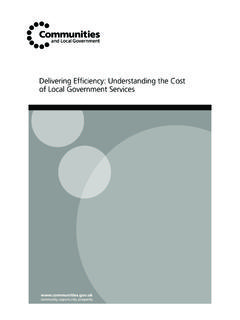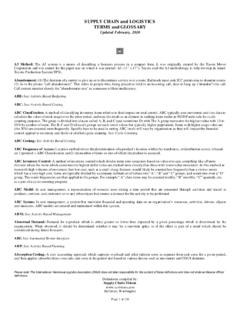Transcription of ANNE AMEELS e-mail: anne.ameels ... - Management Theories
1 D/2002/6482/18 VALUE- based MANAGEMENTCONTROL PROCESSES TO CREATE VALUE THROUGH INTEGRATIONA LITERATURE REVIEWANNE AMEELSe-mail: DR. WERNER BRUGGEMANe-mail: SCHEIPERSe-mail: Management :AN INTEGRATED APPROACH TO VALUE CREATIONA LITERATURE REVIEWANNE AMEELSe-mail: DR. WERNER BRUGGEMANe-mail: SCHEIPERSe-mail: ScheipersGeert Scheipers holds a Master in Commercial & Financial Sciences, special topics on banking & finance. He is guestlecturer at the VLGMS, is member of the editorial staff of the Belgian Institute of Management Accountants &Controllers and is author of a number of articles and papers within the field of Strategy & Control .Anne AmeelsAnne AMEELS is research assistant Management Accounting & Control at the Vlerick Leuven Gent BruggemanWerner Bruggeman is Professor in Management Accounting and Control at the Ghent University and at the VlerickLeuven Gent Management School.
2 He is Partner at the Vlerick Leuven Gent Management School and ManagingPartner at B&M Consulting, specialized in implementing Integrated Performance Measurement and Activity-basedCost Management Systems. His research concentrates on the relation of strategy, organization and the last decades, Management accounting faced increasing challenges to adopt newapproaches, designed to fit the changes in the economic environment and to correct perceivedinefficiencies in existing controlling structures. This paper focuses on one of those recentdevelopments, viz. value- based Management (VBM). Since VBM is claimed to be changingfinancial Management at the highest level in some of the world's largest companies, this literaturereview compares the value- based Management approaches of six consultants, viz. Stern Stewart& Co, Marakon Associates, McKinsey & Co, PriceWaterhouseCoopers, Consulting andHOLT Value Associates and tries to assess the potential of their Management Management can be defined as an integrated Management control system thatmeasures, encourages and supports the creation of net worth.
3 Although VBM is more thanmetrics, we first focused on a non-exhaustive number of value- based metrics, divided in twosegments, the listed perspective-segment and the non-listed metrics are a means and not the goal of a VBM-program, we compared not only the metricsused by the six consultants, but also analysed their value- based Management constructs as awhole. This analysis was based on the fundamental components of a holistic VBM-program, asdefined by several researches on value- based Management . This comparison revealed some clearsimilarities between the approaches, but also demonstrates distinctions and different is for instance a clear unanimity about the focus on maximizing shareholder value, aboutthe conviction that the interests of all stakeholder groups are best served when putting theshareholder first and about the impact of value- based Management on the similarities, they all six suggest using different types of measures, combinedifferent systems and processes, have other views on strategy development and advocate theirown training & education INTRODUCTIONIn the last decades, Management accounting faced increasing challenges to adopt newapproaches.
4 Designed to fit the changes in the economic environment and to correct perceivedinefficiencies in existing controlling the 1950s and 1960s an important debate focussed on the character of information fordecision-making. Another group of scholars addressed the issue whether the contribution marginapproach was superior to systems that fully allocated overheads. In the 1970s several researchersflocked around the topic of residual income and the optimal control of relatively recently with new developments in Management accounting it appears that the threeletter acronyms are becoming very popular. Some of the most fashionable are: SMA (strategicmanagement accounting), ABC, ABM & ABB (activity- based costing and its variants; activity- based Management and activity- based budgeting), BPR (business process re-engineering) andBSC (balanced scorecard).
5 A common element, which distinguishes the later managementaccounting tools from the earlier ones, is that the more recent apparati have emergedpredominantly from practice and from consultants. Another modern-day hot topic in practice,which is claimed to be changing financial Management at the highest level in some of the world slargest companies, (Bromwich, 1998) is value- based Management (VBM).This paper presents the results of a literature review of the approaches that thesepractitioners and consultants have developed concerning the pursuit of shareholder value. Theobjective of this study is to assess the potential of these Management frameworks in order toensure that organizations resources are obtained and used effectively and efficiently in theaccomplishment of the organizations objectives. The rationale for this paper is the perceived gapin the literature with regard to an overview of the value- based Management practices first chapter of this paper is a brief description of value- based Management .
6 We willconcisely describe the history behind VBM, propose a general definition and give some insightsin the application of value- based Management . The second section pursues the matter ofperformance measurement. In this chapter we will introduce the most common valuation toolsthat are being used in value- based Management systems. Because metrics are not the end to avalue- based Management program we describe in section four what kind of ingredients are5indispensable in a well-designed VBM system. The methodology we used here is a review of theliterature concerning the integrated approach of six high profile Management consulting fifth and last section is a conclusive VALUE- based Value- based Management in PerspectiveValue- based Management is a Management control system that measures, encourages andsupports the creation of net worth.
7 In the mainstream Management accounting viewpoint theconcept of control systems results from the behavioural shortcomings mentioned in the agencytheory. In the perspective of a firm regarded as a set of contracts among factors of productionwith each factor motivated by its self-interest, a separation of the control of the firm on the onehand and the ownership of the firm, on the other hand, is an efficient form of economicorganization. (Fama, 1980) However this separation can simultaneously cause austeredysfunctional agency theory focuses on the agency relationship between the actor or the group (theagent), who has certain obligations to fulfil for another actor or group (the principal) because oftheir economic relationship. The selection of appropriate governance mechanisms between theagent and the principal is, given the assumption that agents are motivated by their self-interest,necessary to ensure an efficient alignment in their interests.
8 This alignment in interests can bedisturbed by two main problems: the agency problem and the problem of risk sharing. Theagency problem rests on the assumption that the desires and goals of the agents and principalscan conflict; and that it is difficult or expensive for the principal to monitor what the agent isdoing. (Eisenhardt, 1989) The problem of risk sharing is based on the assumption that theprincipal and the agent have also different attitudes towards risks, which explains their differentcourses of action. (Shankman, 1999)Both problems are the corollary of a lack of goal congruence between the objectives of theagents and those of the principals of the organization. The central purpose of Management controlsystems is to lead people to take actions in accordance with their perceived self-interest that arealso in the best interest of the organization.
9 (Anthony and Govindarajan, 2001) Value-basedmanagement systems are conceived to reduce this lack of goal congruence. Moreover, the various6proponents of VBM systems think they have a very good answer to both problems outlined in theagency theory by trying to make managers think and behave more like Defining Value- based ManagementAlthough there is an ongoing polemic regarding the metrics that should be used andinitially even more who could claim the copyright on them, we see that apart from whichmanagement approach or process is used, VBM measures are generally based on comparisonbetween (a) corporate market value & corporate accounting book value and/or (b) on the residualincome measure. (Bromwich, 1998) Moreover, it seems that even in the way the differentpractices are being described, authors tend to veil their concepts in mist.
10 We find however thatmost definitions of value- based Management are a sign of the same way of first set of publicists describes the output of value- based Management : Value- based Management is essentially a Management approach wherebycompanies driving philosophy is to maximize shareholder value by producingreturns in excess of the cost of capital. (Simms, 2001) Value- based Management is a framework for measuring and, moreimportantly, managing businesses to create superior long-term value forshareholders that satisfies both the capital and product markets. (Ronte,1999) Value- based Management is a framework for measuring and managingbusinesses to create superior long-term value for shareholders. Rewards aremeasured in terms of enhanced share price performance and dividend growth. (Marsh, 1999) Value- based Management is a Management philosophy which uses analyticaltools and processes to focus an organization on the single objective of creatingshareholder value.








